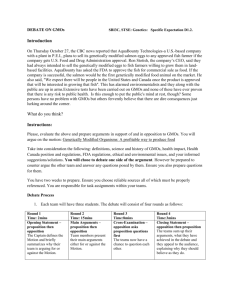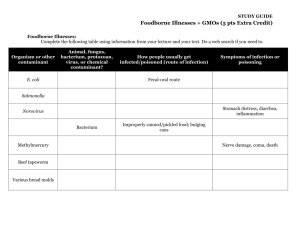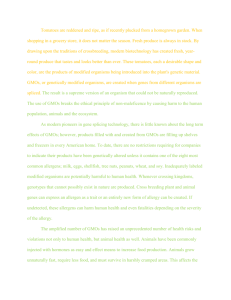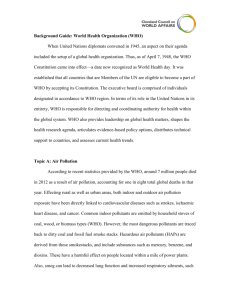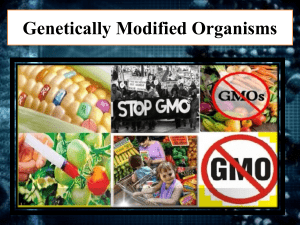The Walloon Decree for the co-existence of plant cultures has been
advertisement
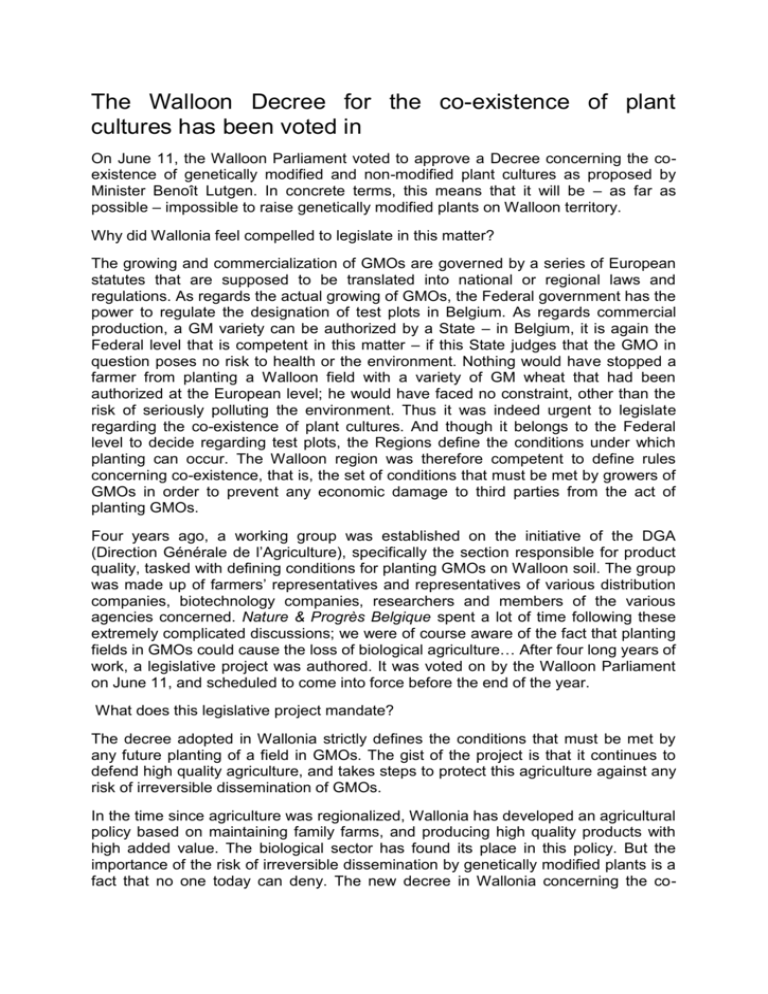
The Walloon Decree for the co-existence of plant cultures has been voted in On June 11, the Walloon Parliament voted to approve a Decree concerning the coexistence of genetically modified and non-modified plant cultures as proposed by Minister Benoît Lutgen. In concrete terms, this means that it will be – as far as possible – impossible to raise genetically modified plants on Walloon territory. Why did Wallonia feel compelled to legislate in this matter? The growing and commercialization of GMOs are governed by a series of European statutes that are supposed to be translated into national or regional laws and regulations. As regards the actual growing of GMOs, the Federal government has the power to regulate the designation of test plots in Belgium. As regards commercial production, a GM variety can be authorized by a State – in Belgium, it is again the Federal level that is competent in this matter – if this State judges that the GMO in question poses no risk to health or the environment. Nothing would have stopped a farmer from planting a Walloon field with a variety of GM wheat that had been authorized at the European level; he would have faced no constraint, other than the risk of seriously polluting the environment. Thus it was indeed urgent to legislate regarding the co-existence of plant cultures. And though it belongs to the Federal level to decide regarding test plots, the Regions define the conditions under which planting can occur. The Walloon region was therefore competent to define rules concerning co-existence, that is, the set of conditions that must be met by growers of GMOs in order to prevent any economic damage to third parties from the act of planting GMOs. Four years ago, a working group was established on the initiative of the DGA (Direction Générale de l’Agriculture), specifically the section responsible for product quality, tasked with defining conditions for planting GMOs on Walloon soil. The group was made up of farmers’ representatives and representatives of various distribution companies, biotechnology companies, researchers and members of the various agencies concerned. Nature & Progrès Belgique spent a lot of time following these extremely complicated discussions; we were of course aware of the fact that planting fields in GMOs could cause the loss of biological agriculture… After four long years of work, a legislative project was authored. It was voted on by the Walloon Parliament on June 11, and scheduled to come into force before the end of the year. What does this legislative project mandate? The decree adopted in Wallonia strictly defines the conditions that must be met by any future planting of a field in GMOs. The gist of the project is that it continues to defend high quality agriculture, and takes steps to protect this agriculture against any risk of irreversible dissemination of GMOs. In the time since agriculture was regionalized, Wallonia has developed an agricultural policy based on maintaining family farms, and producing high quality products with high added value. The biological sector has found its place in this policy. But the importance of the risk of irreversible dissemination by genetically modified plants is a fact that no one today can deny. The new decree in Wallonia concerning the co- existence of plant cultures was obliged to take that into account. The text adopted by the Government says, in particular: there is an obligation to register. Any person desiring to plant a parcel of land with genetically modified plants must register with the proper authority; thus the fact that these parcels are being planted with these organisms will be known to all. In addition, the GMO producer must notify all neighboring farmers of his intention to plant such crops in the designated areas, as well as all those with whom he shares equipment, and the owner of the land ; the isolation of the parcel must be rigorously organized : separation distances are prescribed for biological cultures, and the same is true for conventional cultures. It will also be prohibited to grow plants of the same species in neighboring parcels ; conditions of growing will also be defined, from the seeds to the storage of the crop, in order to prevent contamination of neighboring fields by the GMOs ; farmers that choose to grow GMOs must contribute to a fund that would reimburse farmers that suffer economic losses because of accidental contamination. The principle, he who pollutes pays, will be in force! A system of penalties will be implemented, which provides (among other things) for violators to lose their land. Finally, the Walloon decree provides for the definition of GMO-free zones for farmers who are in favor. A text unique at the European level. Certainly, the applicable regulations – which must still be written – will make the measures provided for in the decree more precise. Here at Nature & Progrès Belgique, we will not relax our vigil, so that these regulations will in truth prevent all dissemination of GMOs into our environment, so that the excellent quality of biological food products produced in Belgium may be preserved, to the great benefit of the health of the consumer. We aren’t afraid to say it: the text adopted by the Walloon Government is one of the strictest laws concerning co-existence of plant cultures that exists at the European level. It is thus appropriate for us to continue on this path by carrying to the European level the basic and vital debate about co-existence between genetically modified and non-modified plant cultures. The other Member States in the European Union need to find the courage to prevent the pollution of their agriculture by GMOs. The future quality of European agriculture is at stake! For more information: Nature & Progrès Belgique Rue de Dave, 520 5100 Jambes 081/32.30.53 - communication@natpro.be

